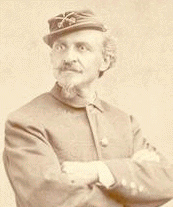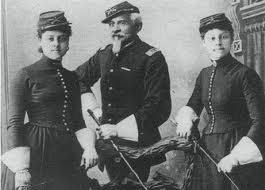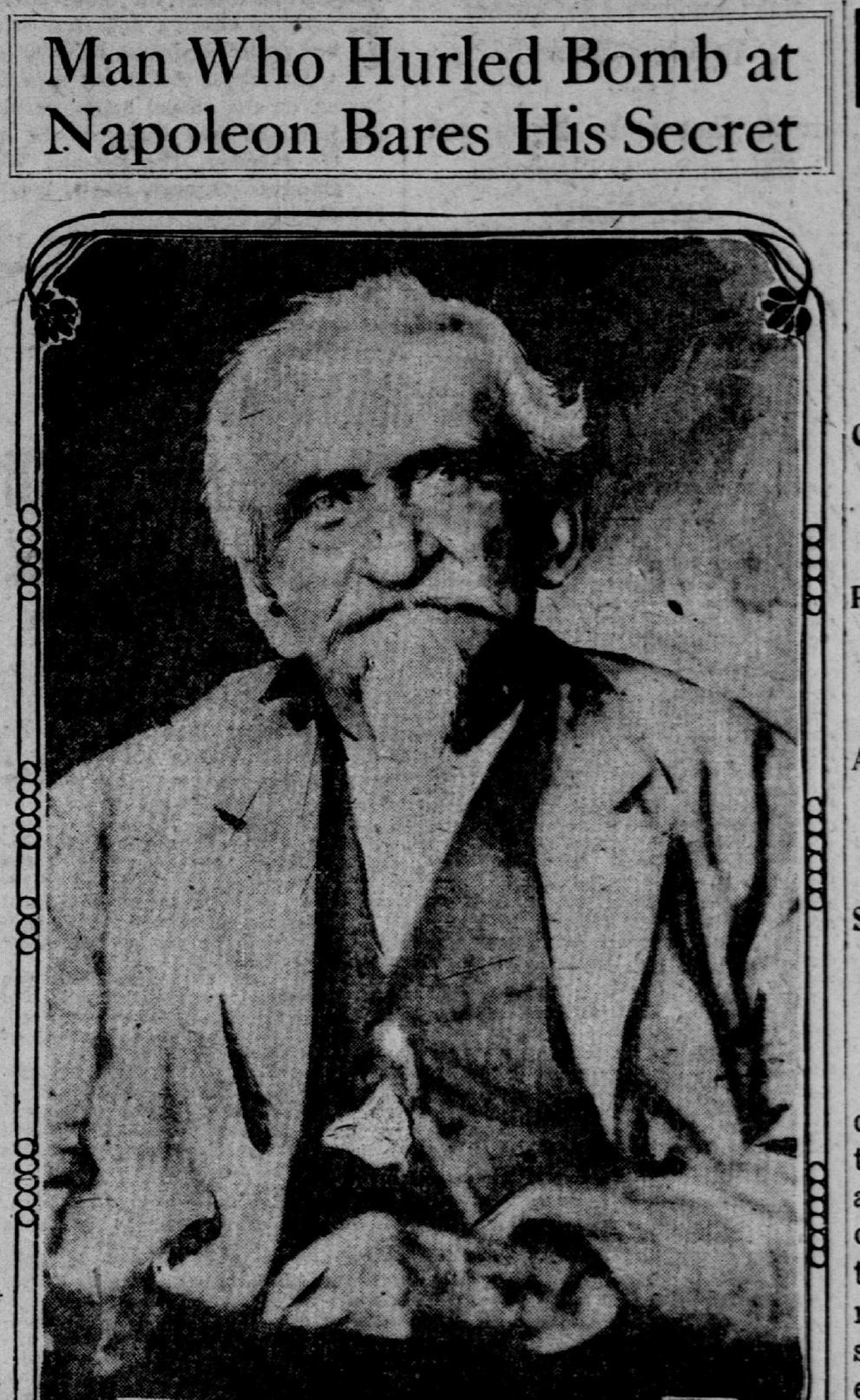Give me your tired, your poor,
Your huddled masses yearning to breathe free,
The wretched refuse of your teeming shore.
Send these, the homeless, tempest-tost to me,
I lift my lamp beside the golden door!
How about, let’s see, how about adding to that wretched refuse list, convicted assassin. We last encountered the fiery revolutionary Carlo di Rudio somewhere near the Equator with a short life in front of him before the guards or the fevers got him on Devil’s Island.
Di Rudio, or as it became more commonly used in the press de Rudio or even Derudio, certainly had been Tempest-tost — and very nearly toast — escaping from the French. To get off Devil’s Island and find sanctuary with the British in the colony of British Guiana he and his companions had drifted 1,000 miles in an open boat and had landed by mistake, temporarily at least, on a less friendly shore in the shape of Dutch Guiana, from where they could have been sent straight back to the French to serve their sentence.
He was accepted back into England (no friend of the French), but it was perhaps too old and cold and settled in its ways there. Though he did but know it, his heart cried out for California. In America, the young man who was once the most wanted insurgent across half of Europe settled down to a long, quiet, uneventful anonymous life under the American flag and died aged 78, in Los Angeles.
Well, not quite…
De Rudio made up for lost time in returning to his childhood dream of being a soldier. He arrived in New York in 1863 in the middle of the war. In 1864 he signed up as a private in a volunteer New York regiment whose pretended ancestry was in Scotland — all kilts, trews and red and white checkered socks. Within months he was a second lieutenant shepherding one of the new black regiments. He saw action in both units and by all accounts acquitted himself well as a leader of men in war.
Civilian life back in New York did not suit him. Though by now a family man as his wife and two young children had joined him, he quit his clerk’s job and re-enlisted. He did eight months more of clerking in Washington DC with the Quartermaster’s Department until getting back into the fighting arm of the new and shrunken peacetime army first in the 2nd Infantry and in July 1869 the Seventh Cavalry.
With the Seventh after the war ended he was involved in police actions against the Klan activities in Georgia, but it wasn’t long before he went West and once again faced certain death and certain death wasn’t just a melodramatic cliche.
More ink has been spilled over post mortems of the battle of the Little Bighorn than (to put it brutally) there was ever blood in the veins of the lives lost on both sides. De Rudio was there — and he was the oldest officer and a man who had arguably seen more of death for longer than most on either side. Not only was he there, but his calm amid the panic saved at least one more life than his own.
The boredom among the young junior officers in Fort Abraham Lincoln in the Montana Territory would have been broken by the stories that only de Rudio could tell. — stories of the Civil War for those officers too young to have taken part, on escaping from Devil’s Island; on Italy’s famous names, the revolutionaries Garibaldi and Mazzini and most especially of the night he nearly blew up the emperor of France. Did this make the senior officers jealous? Whether it was this or not, Captain Frederick Benteen nicknamed him “Count no-account”. Custer himself claimed that de Rudio was a poorly performing officer. So when the troops rode out for the encounter at the Little Bighorn in June 1876 Custer demoted de Rudio from company E to company A to accompany Major Reno. Custer did this to allow one of his favourites to get the glory of being with him, thus saving de Rudio’s life and condemning another of his cronies to die.
During Reno’s chaotic retreat across the Little Bighorn after the Lakota attacked his detachment, de Rudio lost his horse shot from under him and was one of a small number of men separated on the wrong side of the water from the main force which retreated to make its stand across the river. Most of those hiding out in the scrub woods were soon killed.
De Rudio and a trooper from G company, Sergeant Thomas O’Neill, remained horseless and surrounded for a day and a night on a battlefield only filled with the enemy. Imagine their point of view. They concluded more than once they were dead. They witnessed the sustained frenzy of women as they passed close by among the still warm corpses of men who had rushed from the woods only to be cut down. The women were pounding the faces of their comrades with rocks, pushing sticks down their dead throats and worse. They had contemplated the same for themselves after they too had been killed.
O’Neill had did not get the same low opinion of de Rudio as Custer and Benteen, either as a tactician or as a man. Here’s what he said of the time together when de Rudio gave him courage as O’Neill fell into despair as night fell. “It was now, as much as at any previous time that Lieut. de Rudio showed himself to be one of the coolest and bravest men I ever saw.” You wonder whether de Rudio talked of the morning 20 years before when he confidently expected to have his head chopped off in Paris.
Nevertheless in the long hours when they were just the two alone and they had shaken hands to say their final goodbye, O’Neill recalled that de Rudio asked if he were married. He said no. In reply de Rudio said “I would not care so much if I were alone, but what will my wife and three young children do if I get killed. That’s what is worrying me.”
De Rudio was equal in his praise for O’Neill. Writing to a friend he said: “I should do injustice to my feelings if I omit to mention the fidelity and bravery of Sergt O’Neill. He faithfully obeyed me and stood by me like a brother. I shall never cease to remember him and his service to me during our dangerous companionship.”
The next morning just about dawn, De Rudio thought they were saved. He came out of hiding when he saw a large number on cavalry horses crossing the river. He thought he saw Custer’s brother Tom, so he shouted, only to discover the ‘soldiers’ were the Lakota wearing their newly taken blue blouses of the dead soldiers. They were on their way to attack Reno and Benteen’s command for a second day. The two soldiers were shot at and chased for a couple of hundred yards. They decided to take their final stand in a triangle of fallen cottonwood trees. For three hours with little ammunition they fought off desultory attacks until the Lakota lost interest in the twosome and simply set fire to the surrounding brush and trees to finish them off.
Only the greenness of the wood and stomping out the flames with the butt of O’Neill’s Springfield rifle saved them. Yes they crept back to Reno’s line, waiting till they were sure the voices spoke American and yes, they survived when Reno’s group was reinforced and the Lakota packed up camp and headed away from the battle.
During the inquiry into the Custer massacre, de Rudio sided with the living when he supported Reno and Benteen. Using pragmatism and the fact that he disliked Custer as much as Custer disliked him, perhaps, he confirmed their version of events, though he was alleged to have previously told a colleague that the only way the Reno’s men had survived when they fled to safe ground at the first sign of a fight was because they were commanded by a coward.
Anonymity of army life subsumed him once more. Occasionally after that his back story would surface. When McKinley was assassinated there were calls for the assassin de Rudio’s deportation — and some the south never forgave him for the perceived repressions of the cavalry against the Klan during reconstruction. In Italy a sister thought he was long dead and so de Rudio finally got that quiet uneventful life.

By 1882 the “small man with a florid complexion, wavy iron gray hair, moustache and imperial beard” with his marked Italian accent had made captain in the Seventh. The ladder of promotion emptied a topmost rung when a depressed lieutenant colonel in Arizona shot himself through the eye and everyone moved up a step. With postings in the new Fort Meade (near Deadwood, to protect the Black Hills) and later in Texas and New Mexico, de Rudio fulfilled that childhood ambition to be a simple soldier. He finally ended up in San Diego, where he retired with the rank of captain in 1896, later moving to Los Angeles.
He was discovered once more in 1908 and Corriere della Sera sent a local reporter to interview him. The local papers picked up the story once more of the night in 1858 when the cavalry officer threw his bomb.

De Rudio finally died for the last time in November 1910, with his wife and daughters at his bedside.
One wonders whether the aging widow Empress Eugenie, still living and in exile in Chislehurst, Kent, England, the woman who he had come close to killing 50 years before and who was the one who interceded to save de Rudio’s life ever got to hear about him.
